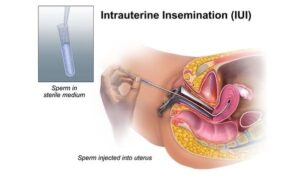Intrauterine Insemination (IUI) is a simple procedure that puts sperm directly inside your uterus, which helps healthy sperm get closer to your egg.

Why it’s done ?
A couple’s ability to become pregnant depends on many different factors. Intrauterine insemination is used most often in couples who have:
- Donor sperm. For women who need to use donor sperm to get pregnant, IUI is most commonly used to achieve pregnancy. Frozen donor sperm specimens are obtained from certified labs and thawed before the IUI procedure.
- Unexplained infertility. IUI is often performed as a first treatment for unexplained infertility along with ovulation-inducing medications.
- Endometriosis-related infertility. For infertility related to endometriosis, using medications to obtain a good-quality egg along with performing IUI is often the first treatment approach.
- Mild male factor infertility (subfertility). Your partner’s semen analysis, one of the first steps in the medical assessment of infertility, may show below-average sperm concentration, weak movement (motility) of sperm, or abnormalities in sperm size and shape (morphology). IUI can overcome some of these problems because preparing sperm for the procedure helps separate highly motile, normal sperm from those of lower quality.
- Cervical factor infertility. Your cervix, at the lower end of the uterus, provides the opening between your vagina and uterus. Mucus produced by the cervix around the time of ovulation provides an ideal environment for sperm to travel from your vagina to the fallopian tubes. But, if your cervical mucus is too thick, it may impede the sperm’s journey. The cervix itself may also prevent sperm from reaching the egg. Scarring, such as that caused by a biopsy or other procedures, can cause the cervix to thicken. IUI bypasses your cervix, depositing sperm directly into your uterus and increasing the number of sperm available to meet the awaiting egg.
- Ovulatory factor infertility. IUI may also be performed for women who have infertility caused by problems with ovulation, including an absence of ovulation or a reduced number of eggs.
- Semen allergy. Rarely, a woman could have an allergy to proteins in her partner’s semen. Ejaculation into the vagina causes redness, burning and swelling where the semen contacts the skin. A condom can protect you from the symptoms, but it also prevents pregnancy. If your sensitivity is severe, IUI can be effective, since many of the proteins in semen are removed before the sperm is inserted.
How does IUI work?
IUI stands for in intrauterine insemination. It’s also sometimes called donor insemination, alternative insemination, or artificial insemination. IUI works by putting sperm cells directly into your uterus around the time you’re ovulating, helping the sperm get closer to your egg. This cuts down on the time and distance sperm has to travel, making it easier to fertilize your egg.
Before having the insemination procedure, you may take fertility medicines that stimulate ovulation. Semen is collected from your partner or a donor. It goes through a process called “sperm washing” that collects a concentrated amount of healthy sperm from the semen.
Then your doctor puts the sperm right into your uterus. Pregnancy happens if sperm fertilizes your egg, and the fertilized egg implants in the lining of your uterus.
IUI is a simple and low-tech procedure, and it can be less expensive than other types of fertility treatments. It increases your chances of pregnancy, but everyone’s body is different, so there’s no guarantee that IUI will work.
What can I expect during IUI?
Before IUI, you may take fertility medicines that help make your eggs mature and ready to be fertilized. Your doctor will do the insemination procedure during ovulation (when your ovaries release an egg). Sometimes you’ll be given hormones that trigger ovulation. They’ll figure out exactly when you’re ovulating and ready for the procedure to maximize your chances of getting pregnant.
Your partner or donor collects a semen sample at home or in the doctor’s office. The sperm are prepared for insemination through a process called “sperm washing” that pulls out a concentrated amount of healthy sperm. Sperm washing also helps get rid of chemicals in the semen that can cause reactions in your uterus and make it harder to get pregnant. If you’re using donor sperm from a sperm bank, the sperm bank generally sends the doctor’s office sperm that’s already “washed” and ready for IUI.
During the IUI procedure, the doctor slides a thin, flexible tube through your cervix into your uterus. They use a small syringe to insert the sperm through the tube directly into your uterus. Pregnancy happens if sperm fertilizes an egg, and the fertilized egg implants in the lining of your uterus.
The insemination procedure is done at your doctor’s office or at a fertility clinic, and it only takes about 5-10 minutes. It’s pretty quick, and you don’t need anesthesia. IUI is usually not painful, but some people have mild cramping.
